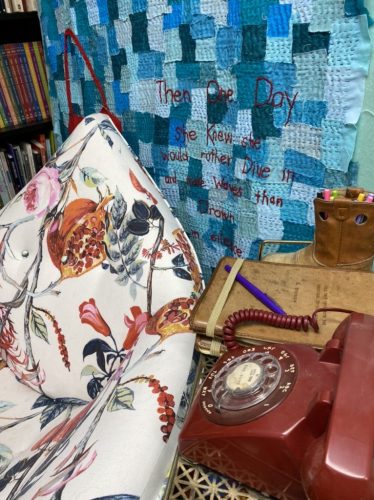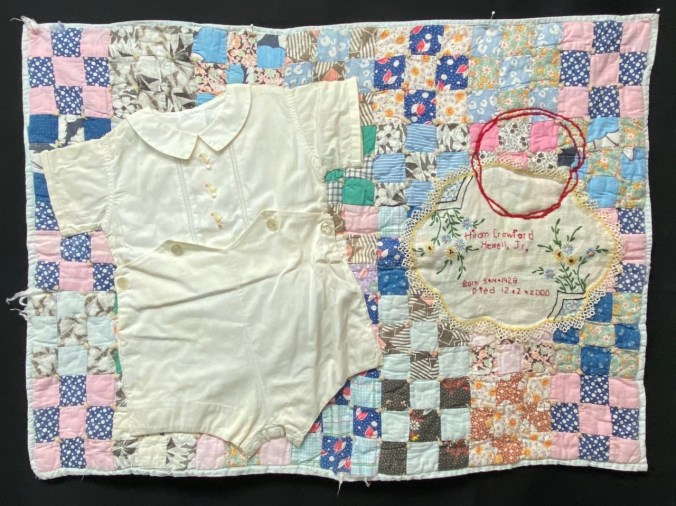
As self-appointed family historian,
I’ve spent my entire life researching in preparation
to write this book about
what happened to my family in May 1933,
In an attempt to capture information I don’t have,
I pen letters to my daddy,
my Uncle Gene,
my Grandmother and my Granddaddy.
After a brief breathing break,
I take a clean sheet of paper
and channel them,
recording their responses
in letters penned back to me.
It never fails to be an amazing event,
but oh how I long to hear their back door
slam behind me
as I walk into their house,
always invited,
never announced,
to sit with them at their kitchen table.
I ache for one
(okay, 26)
(or maybe 512)
(at least)
more opportunities to sit with them
and ask questions about their loves, their lives.
How did you meet?
Why did you fall in love with each other?
What were your favorite songs, colors, books?
Did you like to dance?
Did y’all laugh a lot?
What did you wear to your wedding?
Sometimes I’d just like to hear their smiles,
as they answer commonplace questions like
Whatcha doin’?
What did you have for breakfast this morning?
Whatcha gonna’ do the rest of the day?
So many questions I long to ask
especially questions
about that horrific weekend in May 1933.
Were you terrified?
How did you comfort each other?
What thoughts ran through your minds?
How did you stay calm?
What were the emotional after shocks like?
and so on.
Today as I gather
my thoughts, newspaper clippings,
photos, letters, and other ephemera
related to what happened that weekend
and prepare to start writing for real this time,
I remember reading about a telephone booth
installed in a field in Otsuchi, Japan,
complete with a disconnected telephone.
In 2011, the small town of Otsuchi was
eviscerated by a double-whammy:
a tsunami and an earthquake.
They lost everything, including 2000 residents.
Itaru Saski was already grieving,
wishing to share just one more cup of tea with his cousin
who died before the tsunami came.
As others around him rebuilt,
Itaru followed the urgings of his heart,
nestling an old telephone booth in his garden.
Calling it the Wind Phone,
he issued an open invitation for others
to come and place
calls to their deceased loved ones.

On the heels of this memory,
I look around me, and I move as if a puppet at the end of a string . . .
My studio is home to a chair I sat in as a teenager,
reclining in its outstretched arms
talking on the phone for hours.
Next to it I place a mid-century modern
telephone table found in a thrift shop years ago.
I have “a thing” for mid-century modern.
Atop this table now sits the red phone I announced I wanted
on a trip to Asheville years ago.
I didn’t know why I wanted it,
I just did,
and it may or may not surprise you to hear
that it was the first thing I spied upon
entering my favorite shop.
Beside the phone is one of my son’s boots
turned pencil holder
and 2 journals The Engineer
gifted me three years ago.
The front of one journal reads
Fill your paper with the
breathings of your heart.
~ W. Wordsworth
The other journal wears these words:
May today there be peace within.
May you trust that you are
exactly where your are meant to be.
May you not forget the
infinite possibilities that are born of
faith in yourself and others.
May you use the gifts that you have received,
and pass on the love that has been given to you.
May you be content with yourself just the way you are.
Let this knowledge settle
into your bones,
and allow your soul the
freedom to
sing, dance, praise, and love.
It is there for
each and every one of us.
Magic!
And it all happened in the space of 4 minutes.
I’m not kidding.
Now, when the longing punches my heart,
I will sit in this chair,
tucked into the far corner of my studio
where no one can see me without trespassing
and use my personal Wind Phone
to find solace
and who knows –
maybe some answers, too.
And you know what else?
I hereby proclaim that One Day
I will install a public Wind Phone
– 2 of them, actually
or maybe 3 –
each with an open invitation
and free long (long, long, long) distance calling.
The thought excites me,
and I look forward to doing just that.
For now, though, a photo goes on my Vision Board,
and when the time is Right
and everything aligns,
the other public Wind Phones will most certainly come to be.
~~~~~~~
This just in:
my friend Margaret Williams
just sent me a link to
a text version of the wind phone.






here ‘n there